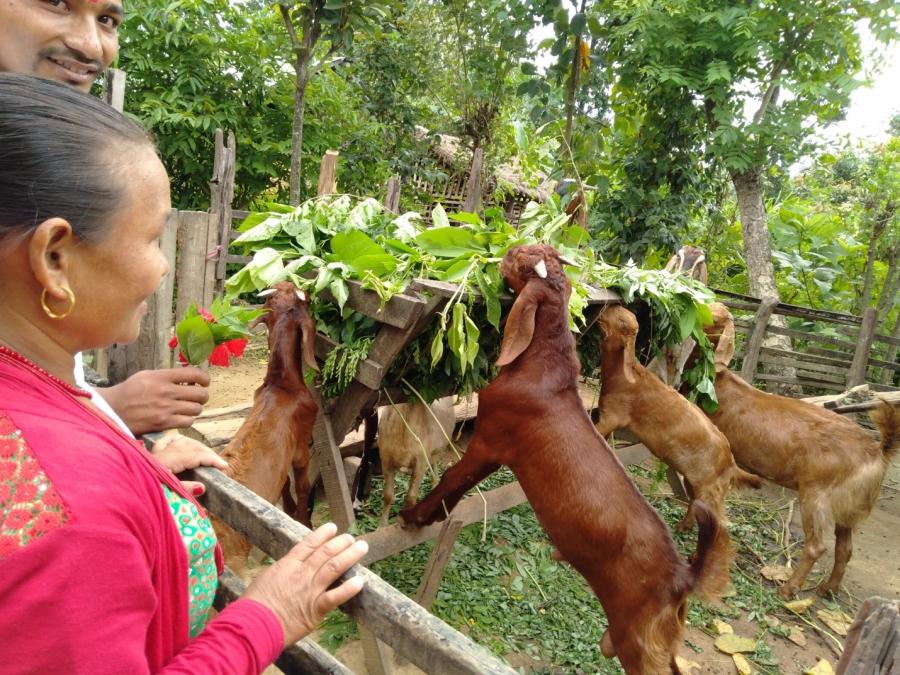Bóthar changing lives and empowering communities in Nepal
Nepal is one of Bóthar’s priority countries since 2005. A longstanding partnership with Heifer International Nepal and local partner Prayas Nepal is making possible to reach the poorest of the poor in the country, those who in the cast system are considered untouchables.
Programme Manager Patty Abozaglo and Technical Advisor Vet Surgeon, Dr. Brendan Mimnagh travelled to Nepal last September on a field trip to visit the communities receiving support as part of a livestock three- year project ( 2018-2020). We were very happy to see how women farmers are getting maximum benefit of the project. We confirmed that all animals were in good health. This means that families get better prices when animals are sold in the market.
In Nepal, 25% of the population is poor. Relief Web reported that between 1996 and 2006, the civil war between government armed forces of Nepal and Maoists left thousands of people dead, and many more displaced. Economic migration is big in Nepal too.
The earthquake in 2015 killed nearly 9,000 people and injured over 22,000 people. Thousands of people lost their homes and their jobs and were forced to find other ways to make a living. To-date reconstruction work continues. Bóthar’s funding has reached one of the most affected areas in the central part of the country, in Siddhalek Village, Dhading district.
Over 1,300 families are benefiting from Bóthar’s work in Nepal. The project is starting its third year of implementation. 1,170 women farmers organised in groups have received goats as part of the Pass on the Gift scheme. Goats (local indigenous breed) are very popular animals in Nepal. There is a good market for them as people consume their milk. Women participants commit themselves to learn how to rear their goats and to pass on the first breed to another woman farmer. One cooperative is being set up where women farmers have the opportunity to sell their goats at better price.
During this trip, we saw how women have benefitted from this project. Women visited said how grateful they were with Bóthar support: “This project has brought better health and nutrition for our families. It has given us the opportunity to learn and generate our own income. The goats are healthier and we can sell them at a better price in the market. We are eating better and we are learning how to do business too” It is also perceived that families have been reunited, as husbands who had migrated have returned to their families and are involved in the project.

Bóthar in Nepal: Making a Difference in Women’s Lives
Dayalaxmi is one of the female farmer’s participants in this project, who we visited this time.
Before, she was just like any other women in her community, she was mostly engaged in housework but after her engagement in project, her life changed and she feels motivated to contribute to the development of her community.
Personally, she says: “the project made me more interested in goat farming. I thought I was weak and incapable but my perception changed. At the beginning, I felt I was not confident enough. Participating in the project, I learned that the first step is to think positively and believe in the work you initiate. Now, I am confident and able in expressing my thoughts and opinions. I also feel accountable for the decisions I make.” She currently has 21 goats and has already invested in building a shed for her goats. Her husband participates in the project too.
Dayalaxmi is the Chairperson of the Ganesthan Self Help Group, which is one of the various groups set up by this project. She is the first chairperson. As part of the project activities, the group has received training on improved animal management, fodder forage among others.
She believes that accountability is a core principle. Being the chairperson, she says: “I represent the group and ensure that all members receive the same knowledge. In my leadership, I was able to get 18 goats from the Rural Municipality.” As a representative of the group, she has had the opportunity to participate in a three-day exposure visit which boosted her confidence.
The project has provided support to build sheds for the animals, a breeding buck and fodder-forage. They are now getting ready to share the off springs on its Pass-On Ceremony. Another benefit is that participants are now affiliated to Upahar Mahila Cooperative, which is getting stronger and scaling up as increasing sales of goats and other related products (e.g. fodder) are taking place.
